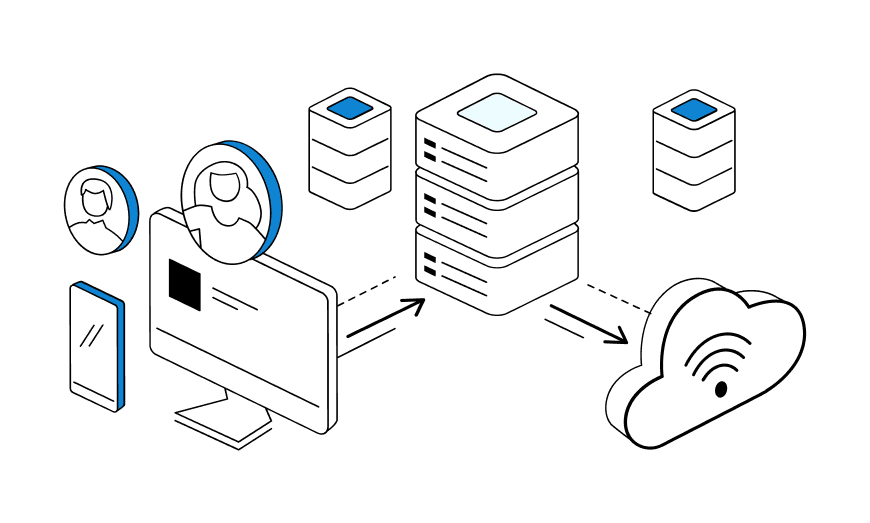
A web server (also known as a "hosting computer") is a device that stores files hosted by a website. These include HTML documents, CSS stylesheets, images and other types of files. HTTP technology allows the server to send these files directly to a browser on request.
A typical webserver is composed of both hardware and software. Hardware component includes server and storage device (such as a drive). Software component includes components which control the way hosted content is delivered.
Static and dynamic web servers are available. Static web servers host files exactly as they are. Dynamic web servers, on the other hand, update files when clients request them.
Google is known to have built many of their own servers. Director of engineering Ben Jai stated that Google takes a unique approach in terms of data center architecture. For example, Google doesn't rely on giant machines to provide power in its data centers--it instead uses batteries that kick in automatically and quickly in the event of a power outage.

He said that the battery design allows Google to reduce energy costs. The company also has a system to calculate its Power Usage Effectiveness (PUE) every 30 seconds, which allows engineers to develop a predictive model that predicts and adjusts cooling to conserve energy.
Google's "defense in-depth" approach, which uses standard industry firewalls, access lists, and security measures, to protect its network, is another way it saves energy. These measures aim to identify and correct destabilizing situations and to slow potential attacks down before they can cause serious problems.
Its servers are also protected by proprietary systems that monitor for binary modifications and return them to their standard, non-modified state in the event of a security breach. Google's automated self-healing mechanism is a key part of its efforts to safeguard its networks.
Google's computer systems are further protected by software which constantly monitors for suspicious behavior and alerts the company's Security teams. This prevents Google's servers from being compromised by outside hackers.
Google's computer systems are protected with specialized hardware. This helps identify memory leaks, and other problems which could lead to a system failure. These devices use magnetic sensors to detect how much memory on a PC is exposed. If necessary, they reload that memory.

Google's internal Internet, which spans over 40 data centers around the world, is largely built on custom-built proprietary tools. These include a top secret distributed file system named GFS, and Spanner, a platform that replicates and moves loads between its data centres when traffic or hardware problems arise.
Google itself states that there are 1.8billion active users who rely upon the giant search engine for at least 27, petabytes. This is enough space to store all of the photos, documents and data held by Google.
FAQ
How do you create a free website.
This will depend on the type and purpose of your website. Do you want to sell products online? Start a blog? Build a portfolio?
You can make an essential website using only HTML and CSS (a combination of HyperText Markup Language and Cascading Style Sheets). It is possible to make a basic website with HTML and CSS. However, many web developers recommend using a WYSIWYG editor, such as Frontpage or Dreamweaver.
A freelance developer may be the best choice if you don't have any experience in designing websites. They will help you design a website that suits your specific needs.
A freelance developer may charge you either a flat-fee per project, or an hourly fee. The price of hiring a freelancer will vary depending on how much work is completed within a specified timeframe.
For example, companies may charge 50-100 dollars an hour. You'll usually get higher rates for larger projects.
In addition, many freelance websites list available jobs. It is possible to search on these websites before reaching out directly to potential developers.
WordPress is it a CMS?
Yes. It's a Content Management System. CMS allows you to manage the content of your website from within a web browser, instead of using applications like Dreamweaver and Frontpage.
WordPress is completely free! Hosting is included in the price, but you don't need to pay anything else.
WordPress was initially created as a blogging platform, but it now offers many other options such as eCommerce sites, forums and membership websites. Portfolios are also available.
WordPress is very easy to set up and install. The installation file must be downloaded from the website and uploaded to your server. You can then visit your domain name using your web browser to log in to your new website.
After installing WordPress you will need to create a username/password. After logging in, you will see a dashboard that allows you to access all your settings.
From here, you can add pages, posts, images, links, menus, widgets, and plugins. This step can be skipped if editing and creating content is easy for you.
But if you'd rather work with someone, you can hire a professional website designer to handle everything.
How to create a static website
You have two options when creating your first static site:
-
Using a Content Management System (a.k.a. WordPress: Download this software and install it to your computer. It can be used to create a website.
-
You will need to create a static HTML website. If you already know HTML, it is simple to do.
It is worth hiring an expert if you want to build large websites.
You should start with option 2.
Are I more likely to be hired for a job as a Web Developer if my portfolio is good?
Yes. A portfolio is essential when landing a web designer or developer job. The portfolio must show examples of your skills and experience.
A portfolio typically includes samples from your past projects. You can include anything that demonstrates your skills. Include everything: mockups; wireframes; logos; brochures; websites and apps.
How do I design a website.
The first step is to understand what you want your site to do for your customers. What do they look for on your site?
What other problems could they face if they can't find the information they need on your website?
Once you know this, you must figure out how to solve those problems. Your site must look professional. It should be easy to use and navigate.
Your site should be extremely well designed. It shouldn't take too many seconds to load. People won't stay as long if it takes too long to load. They will move on to something else.
If you want to create an eCommerce site, think about where all of your products are located. Are they all located in the same location? Are they all in one place?
It's important to decide if you want to sell just one product or multiple products. Do you prefer to sell one type of product, or several types?
These questions will help you decide if you want to build your website.
Now, it's time to take care of the technical aspects. How will your site operate? Is it fast enough? Are people able to get it done quickly from their computers?
Will they be able buy anything without having pay an extra fee? Are they required to register before they can buy anything?
These are crucial questions you should be asking yourself. Once you know the answers to these questions, you'll be ready to move forward.
How much do web developers make?
A website is a project you can work on for your own money. You'll likely make $60-$80 an hr. However, if you wish to charge more, you can become an independent contractor. The hourly rate could be anywhere from $150 to $200
Statistics
- It's estimated that chatbots could reduce this by 30%. Gone are the days when chatbots were mere gimmicks – now, they're becoming ever more essential to customer-facing services. (websitebuilderexpert.com)
- In fact, according to Color Matters, a signature color can boost brand recognition by 80%. There's a lot of psychology behind people's perception of color, so it's important to understand how it's used with your industry. (websitebuilderexpert.com)
- Is your web design optimized for mobile? Over 50% of internet users browse websites using a mobile device. (wix.com)
- Did you know videos can boost organic search traffic to your website by 157%? (wix.com)
- It's estimated that in 2022, over 2.14 billion people will purchase goods and services online. (wix.com)
External Links
How To
What is website hosting?
Website hosting is the location where people go when they visit websites. There are two types of website hosting:
-
Shared hosting - This is the cheapest option. Your website files reside on a server controlled by someone else. Your customers' requests travel via the Internet to your server when they visit your site. The owner of the server then hands off the request to you.
-
Dedicated hosting – This is the most expensive option. Your website is hosted entirely on one server. Your traffic is private because no other websites have shared space on this server.
Shared hosting is preferred by most businesses because it's cheaper than dedicated hosting. With shared hosting, the company that owns the server provides the resources needed to run your website.
Both options have their pros and cons. These are the key differences between them.
The pros of shared hosting:
-
Lower Cost
-
Easy to Set Up
-
Frequent Updates
-
It is possible to find it on many web hosting companies
Shared hosting is often as cheap as $10 per month. But keep in mind that this price usually includes bandwidth. Bandwidth refers the data that you can transfer over the Internet. So even if you only upload photos to your blog, you may still pay extra money for high amounts of data transferred through your account.
Once you begin, you will soon see why you spent so much on your previous host. The majority of shared hosts offer limited customer support. Although they will help you set up your site occasionally, you are on your own once you have done that.
It is important to find a provider that provides 24-hour support. They will help you deal with any issues that arise while your sleeping.
Hosting dedicated:
-
More Expensive
-
Less common
-
Requires special skills
With dedicated hosting, you get everything you need to run your website. You won't worry about how much bandwidth you are using or how much RAM (random Access Memory) you have.
This means you'll have to spend more upfront. However, once you start running your business online, you'll find that you won't need much technical assistance. You'll soon be an expert at managing servers.
Which Is Better For My Business:
The answer will depend on the type and purpose of your website. If you are selling products, shared hosting may be the best option. It's simple to set it up and keep it updated. A server shared with several other sites means that you will receive frequent updates.
However, dedicated hosting is the way to go if you want to build a community around your brand. It allows you to focus on building your brand and not worrying about managing your traffic.
Bluehost.com has both. They offer unlimited monthly data transfers and 24/7 support. You can also register domain names for free.